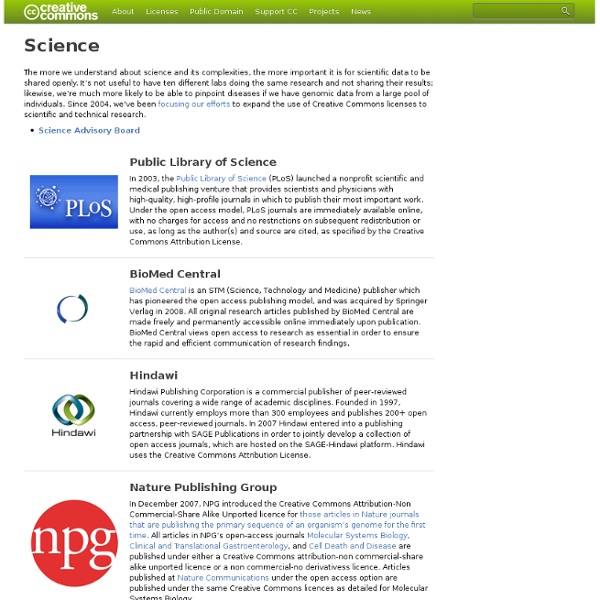Science
The more we understand about science and its complexities, the more important it is for scientific data to be shared openly. It’s not useful to have ten different labs doing the same research and not sharing their results; likewise, we’re much more likely to be able to pinpoint diseases if we have genomic data from a large pool of individuals. Since 2004, we’ve been focusing our efforts to expand the use of Creative Commons licenses to scientific and technical research. Science Advisory Board Open Access The Scholars’ Copyright Project Creative Commons plays an instrumental role in the Open Access movement, which is making scholarly research and journals more widely available on the Web. We’re also expanding Open Access to research institutions. We’ve created policy briefings and guidelines to help institutions implement Open Access into their frameworks. Open Data At Creative Commons, we believe scientific data should be freely available to everyone. Learn more
NSDL.org - National Science Digital Library
Genome.gov
Feature Genome exhibition travels to The Tech Museum of Innovation in San Jose, California Following a four-month engagement at the Reuben H. Fleet Science Center in San Diego, the high-impact interactive exhibition, Genome: Unlocking Life's Code, is making its second stop in California. Genomics and Global Health: What does the future hold? The closing symposium for the Smithsonian exhibition Genome: Unlocking Life's Code, will be held on September 30th, beginning at 1 p.m. The 2013-2014 Genomics in Medicine Lecture Series Read about and view the latest series of lectures for Genomics in Medicine. Highlights The American Society of Human Genetics (ASHG) invites you to participate in the 10th Annual DNA Day Essay Contest! Open to students in grades 9-12, the contest aims to challenge students to examine, question, and reflect on important concepts in genetics. Genome exhibition to depart Smithsonian for multi-city tour {*style:<b>*}Bethesda, Md.
High School Human Genome Program
ChemCollective
Related:
Related:



